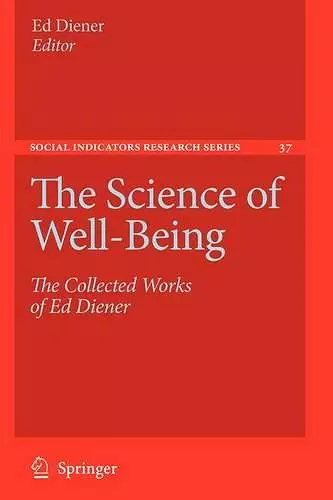The Science of Well-Being
The Collected Works of Ed Diener
Format:Paperback
Publisher:Springer
Published:9th Jun '09
Should be back in stock very soon

Major Theoretical Questions Theories about subjective well-being have grown over the past several decades, but have been re ned only slowly as adequate data have been compiled to test them. We can characterize the theories describing happiness along several dimensions. The rst dimension is whether the theory places the locus of happiness in external conditions such as income and status, as many sociological theories do, or within the attitudes and temperament of the individual, as many psychological theories do. Some have maintained that people adapt to all circumstances over time, so that only individual personality matters for producing happiness, whereas others believe that economicandothersocietalfactorsarethedominantforcesinproducingwell-being. Throughout my writings there is a mix of both the internal and external factors that in uence well-being. A second dimension that characterizes scholarship on well-being is the issue of whether the factors affecting well-being are relative or absolute. That is, are there standards used by people at all times and places in judging their lives and in reacting to events? Or are standards dependent on what other people possess, on expec- tions,andonadaptationlevelsbasedonpastcircumstances?Again,thereisevidence supporting the role of both universal and relative standards. People around the globe are probably in uenced by common factors such as friendship versus loneliness, but even these universal in uences on happiness are probably subject to some degree of comparison depending on what the person is used to and what others have. However, some factors might be much more comparative than other in uences, as Hsee, Yang, Li, and Shen (in press) have described.
From the reviews: “The Science of Well-Being, is a potpourri of papers—literature reviews and theory pieces—that overview the field that Diener helped establish. … Certainly academic researchers interested in well-being will find them extremely useful. … The audience should extend beyond research psychologists and include policy makers as well as interested members of the general public. … the collected works of Ed Diener are timely, impressive, and useful.” (Christopher Peterson, PsycCRITIQUES, Vol. 54 (50), 2009)
ISBN: 9789048123490
Dimensions: unknown
Weight: unknown
274 pages
2009 ed.